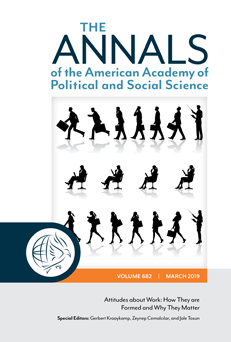Work and work experiences rank highly among human values. Work provides structure, supplies financial opportunities, and shapes both career aspirations and personal satisfaction. Attitudes toward work, moreover, influence society’s welfare and operations.
This volume of The ANNALS investigates what socialization processes and qualities of parents, schools, and workplaces are important in the development of work attitudes, paying particular attention to intergenerational transmission of work attitudes and values. By looking at the determinants of work values and their concurrent effects on politics, the economy, and personal well-being in a number of European countries, this volume offers an improved understanding of work values and their significance to the social sciences, and illuminates how such improved knowledge can influence public policy.

